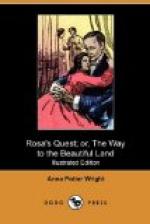“But I can’t think where they’d go, nor what I can do. It seems like somebody’d seen them. I’ll fix them when they git back, so as they’ll never do it ag’in. It looks like they’d been gone fer some time, and I do b’lieve they’ve been into the tea and stove blackin’. I never thought about blackin’, who would? but I told them not to touch that tea, fer I couldn’t afford it. They’ll be sorry, they will, when I git hold of them.
“Here you, Billy Bruce!” she vociferously called, catching sight of that youth running down the stairs three steps at a time; “come right back here at fast as you can, and tell me what you know about Rosa and grandpa. You’re always under foot a-knowin’ what’s a-goin’ on, so I ’spose if anybody seen them you did.”
Billy feared Mrs. Gray more than he did the judge or policeman—that is, at close range; but when occupying the vantage-ground, as at the present, he delighted in revolt.
“I didn’t either see them,” he shouted back, “and don’t know nothin’ about them, only I’d run off, too, if I wuz them.”
At this the greatly abused and misunderstood woman picked up a piece of coal to hurl at the rapidly retreating young rebel, when, to her astonishment, she saw coming up the steps the transformed Rosa with Esther!
“You’d better look out, Rosa,” confidently explained Billy, “she’s awful mad, and you may git that lickin’ yet, you said she’d been a-promisin’.”
Rosa shrank in terror, her face growing pale and twitching nervously, while an inclination to run away with her barbarous but devoted champion took possession of her.
“Never mind, dear,” whispered Esther reassuringly, “she will do you no harm while I am with you. You need not be at all afraid.”
Upon looking into the fearless blue eyes of Esther, Mrs. Gray suddenly determined to change her plan of attack.
“Land sakes, Rosa! I’ve been that worried about you and father, the dear old soul,—where is he? and where have you been, and where did you git them pretty clothes? Why didn’t you tell me you wanted to go on a visit, and what made you stay so long? Of course it wuz awful lonesome here without me, so I won’t blame you much, but children’d ought to tell.”
Not giving the child an opportunity to answer, a volley of interrogations and information was turned upon Esther.
“What’s your name? Esther Fairfax, is it? well, now that’s a real pretty name, but do come right in and set down. Things is in a muss, fer I’ve been gone, and children don’t amount to much fer work, ’specially when they ain’t been raised right. I ain’t had her long, you know, or she’d be different. Her ma wuz awful queer and silly about her. But where did you find her? You wuz real thoughtful to bring her back to me, so as I wouldn’t worry any longer’n necessary. I ’spose you found her clothes in bad shape. Her ma’s been dead now a while, and didn’t keep things up as well as she might anyhow, I thought, fer some time. She wuz one of them women that gives up easy, but that’s somethin’ I never do. I’ve been a-layin’ out to show Rosa how to sew. She’s plenty old enough, and I ain’t got no time to do it myself. But then I never did b’lieve in bringin’ them up lazy. There’s a lot in gittin’ them started right.




